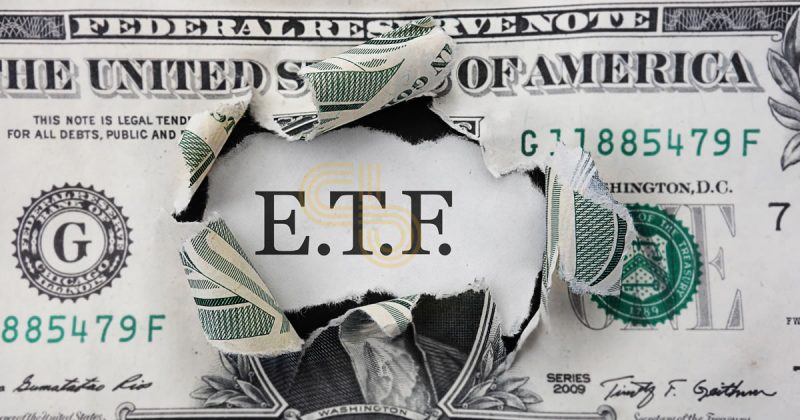
Will ETF Approval Really Lead To A Flood Of Crypto Cash?
The SEC is discussing whether to change rules to accept Bitcoin-based ETF's as securities. Will an influx of institutional crypto cash ensue?
Roses are red, Markets are Green.
ETFs coming, but what does that mean?
Crypto-world has something new to get excited over. The Securities and Exchange Commission is discussing Bitcoin once again, this time over a proposed rule change that may open a new door into the world of high finance. The latest question on the regulators’ desk: whether to change rules to accept crypto-based ETF’s as securities.
It’s the first time a Bitcoin ETF has appeared on the regulators’ desks since, well, a few months ago. Back in January, the Commission slammed the brakes on several regulatory filings, resulting in 12 ETFs and two mutual funds withdrawing their applications.
The question has generated plenty of comments; to say the least, and it is likely that the regulators have never had such interesting reading material before.
-
WTF are ETFs?
Exchange-Traded Funds, or ETFs, can be traded on a stock market in the same way as a regular company’s stock. Typically these are composed to track an index, like SPDR, which tracks the S&P 500, or QQQ, which tracks the Nasdaq 100.
Other ETFs are designed to track commodities or other assets, like gold or bonds.
The advantage is that such funds provide a simplified way of investing in commodities without having to worry about constituent units. Since the average hedge fund probably isn’t interested in figuring out private keys (any more than they’d want to actually possess gold bars, barrels of oil or sacks of grain), the actual bitcoins would remain under the control of a custodian, who bundles them together and issues representative shares.
The Fund currently proposed, by the VanEck SolidX Bitcoin Trust, will issue individual shares of 25 bitcoins, in baskets of five shares each. Safe to say that the Trust is targeting institutional money.
There’s also an element of security: since ETF bitcoins will be kept in insured cold wallets, a large-scale investor has much less cause for worry.
2. What do ETFs mean for crypto?
It’s hard to say what immediate effects an SEC approval would mean for Bitcoin, as digital assets don’t exactly have strong precedents. At present, the leading expectation among cryptonauts (no surprise) is that SEC approval would open the floodgates for institutional money and push prices to McAfee-appendage-saving levels.
Those hopes are probably exaggerated, but there is some reason for optimism. The price of gold, the most Bitcoin-like of real-world assets, is closely tied to the price of gold ETFs. “ETF flows can have a pronounced impact on underlying gold prices,” wrote one blog with the helpful name ETF back in 2016, “and in fact, may be partly responsible for this year’s gold advance.”
Unlike stock ETFs, the article argued, gold ETFs had a strong effect on underlying prices.
Europe is ahead of the curve in this regard— Stockholm-based XBT providers has launched several Bitcoin-based Exchange Traded Notes, CNBC reports, which are available in various markets, and Amsterdam-based Flow Traders NV has signaled its interest as well. The products have a total market capitalization above $1bn.
3. Will the SEC allow ETFs?
This isn’t the first time someone asked for permission to launch a Bitcoin-based fund. The Gemini twins have been pushing for years.The last time the subject came up, regulators slammed the door on crypto ETFs, citing the “unregulated” nature of Bitcoin markets.
This time may be different. The fact that Bitcoin futures have been trading for eight scandal-free months should soothe some worries in Washington. Moreover, the fact that the proposal comes from the Chicago Board of Exchanges—which is somewhat more reputable than the average crypto-exchange—also seems to add weight to the suggestion.
However, there’s still plenty of regulatory inertia to overcome. Cryptoslate, citing the sentiment on industry insiders, reports: “If the ETFs turn out to be massively successful in the US market, the SEC does not benefit from it. However, if the ETFs begin to cause problems that cannot be controlled by the agency, the SEC could be responsible for them.”
Regulators have given themselves until September 15th to think about it. While some commentators are hoping for an August 10th decision, a date between August 16th and up to 90 days beyond seems likely, given the date of the notice in the Federal Register and the rules outlined on page 51 of the SEC notice.
Meanwhile, hodlers are giving them plenty of reading material. Like this guy:
Stop messing around and just have a respected company like Coinbase approve or reject this. You guys have terrible judgement…
To submit a comment, write an email to [email protected] with “SR-CboeBZX-2018-040” in the subject line or visit this page.
While we’re always glad to encourage civic participation, if you do choose to contribute, you might consider making your comment a bit more thoughtful than Laosy Gueses:
July 6, 2018
It’s liiiiiiiiiit.
The author is invested in Bitcoin.
